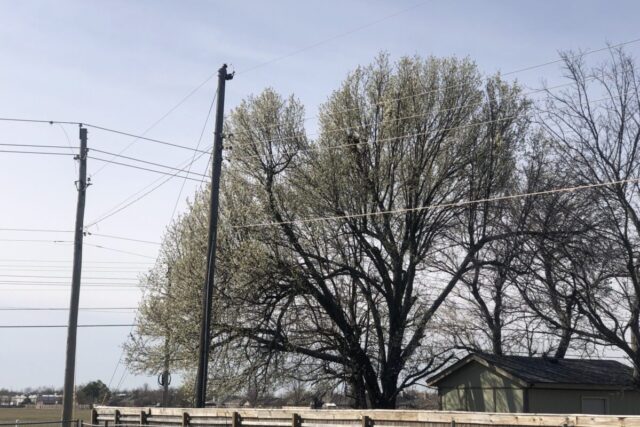

For the second time in 14 months, Norman voters rejected a new franchise agreement with OG&E, a signal the city could consider the virtually unthinkable in Oklahoma’s regulated utility market: changing electricity providers.
On the other hand, the wire-thin defeat of the OG&E proposition — 50.09 percent of voters said “No” — could simply result in continuation of the “implied contract” that a judge affirmed when dismissing a ratepayer lawsuit earlier this year.
With all 60 Norman precincts reporting, unofficial results from the Oklahoma State Election Board showed a 33-vote margin: 8,881 in favor, 8,914 opposed. The day’s high turnout for a city’s franchise agreement vote — generally unremarkable elections — reflected both Super Tuesday presidential primary turnout and the unusual intensity of the OG&E election in Norman.
The regulated, investor-owned power utility spent heavily on the election, sending some households a dozen mailers urging a “Yes” vote under the rhetoric of supporting company employees who work on powerlines.
In the end, however, community concerns about how OG&E does and does not manage its grid in Norman prevailed. Those who spoke against the re-proposed franchise agreement cited beefs about tree trimming and a lack of buried lines that can lead to regular maintenance issues.
Christi Woodworth, OG&E’s vice president of marketing and communication, issued a statement Tuesday evening.
“We are disappointed in the election outcome. Without a franchise agreement, OG&E and the city of Norman will continue to operate under an implied contract. Over the last five years OG&E has worked in good faith with the city, investing tens of millions of dollars improving reliability in the absence of a franchise agreement. Unfortunately, that good faith was not reciprocated,” Woodworth said. “We will evaluate the long-term status of other agreements or projects underway with the city. OG&E has served Norman for more than 100 years and remains committed to our customers. We will continue to provide the electricity they need to power their homes and businesses.
All results are unofficial until they are certified by the State Election Board.
Canadian County approves earlier alcohol on Sundays
In Canadian County, 59.33 percent of voters approved legalizing liquor sales at 8 a.m. on Sunday, as was already allowed on any other day of the week.
Of the 19,085 people who cast ballots, 11,324 voted in favor.
Voters to Wagoner County: Hold your horses
And in Wagoner County, voters roundly rejected all eight propositions related to sales tax matters. The proposals rejected Tuesday include existing revenue streams that would have been extended and new tax levies for county projects. Among the items rejected were funding for the Wagoner County Sheriff’s Office, operations of the county jail, the county courthouse and fairgrounds, and general fund revenues.
Of the eight items, Proposition 1 to fund road and bridge projects received the most support, garnering 25.85 percent of the 13,232 votes cast. Proposition 3, which would have made permanent a 0.1 percent sales tax from 2017, received only 15.71 percent support.
The broad slate of sales tax proposals on Tuesday’s ballot had drawn criticism, even from one Wagoner County commissioner who said he only received information about the proposals the morning he was asked to approve calling an election for them.
Trump, Biden and Oliver win Oklahoma
As expected in Oklahoma and across the nation, President Joe Biden and former President Donald Trump cruised to Super Tuesday presidential primary victories in their respective parties.
In Oklahoma, Trump received more than 81 percent of the vote, while Biden received just shy of 73 percent. In the Libertarian presidential primary, 929 Oklahomans cast ballots, with 61.25 percent choosing Chase Oliver over Jacob Hornberger.
(Correction: This article was updated at 10:10 p.m. Tuesday, March 5, to correct reference in a subhead to the winner of the Libertarian Party presidential primary in Oklahoma.)




















